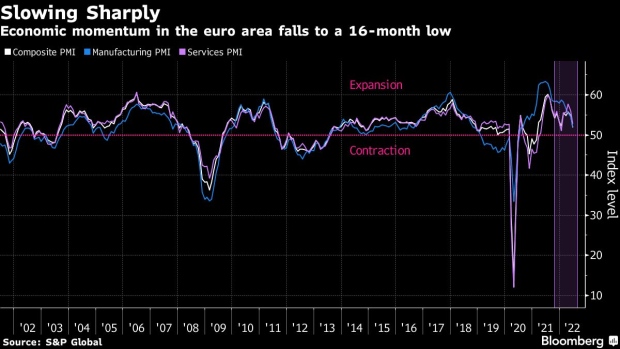Jun 23, 2022
Eurozone Economy Slows Sharply on Squeeze From Record Prices
, Bloomberg News

(Bloomberg) -- Euro-area economic expansion slowed sharply as surging prices curbed the rebound from pandemic restrictions and factories continued to suffer from supply snarls.
An indicator for economic activity by S&P Global fell to a 16-month low in June, driven by rampant inflation, concerns over energy and rising borrowing costs. While the overall gauge still signals modest expansion, manufacturing output declined for the first time in two years.
“Economic growth is showing signs of faltering as the tailwind of pent-up demand from the pandemic is already fading, having been offset by the cost-of-living shock and slumping business and consumer confidence,” S&P Global economist Chris Williamson said in a statement.
Preliminary numbers from Australia, Japan and the UK showed continued growth in all three economies, though the British report signaled that businesses are bracing for a deeper economic slump in the third quarter. Figures from the US are due later Thursday.
In Europe, Russia’s war in Ukraine sent the cost of energy and a widening range of staples soaring just as pandemic restrictions eased. The prospect of higher interest rates, meanwhile, is rekindling concerns over public debt.
What Bloomberg Economics Says...
“The sharp slowdown in the euro-area composite PMI may reflect worsening tensions between Europe and Russia over natural gas supplies weighing on business sentiment and the impact of high inflation and disrupted supply chains. The deterioration is unlikely to deter the European Central Bank from significantly increasing interest rates this year -- its focus is on reining in inflation.”
--David Powell, senior euro-area economist. For full REACT, click here
Germany, which is more reliant on manufacturing than other countries in the region, saw the slowest expansion this month. The country on Thursday elevated the risk level in its national gas emergency plan to the second-highest “alarm” phase, following steep cuts in supplies from Russia.
“It will be a rocky road that we have to travel as a country,” said German Economy Minister Robert Habeck. “Even if we don’t feel it yet, we are in a gas crisis.”
The survey of purchasing managers continued to show elevated price pressures, including a “worrying increase in costs growth in the service sector.” The cooling of demand, however, pointed to a calming of goods prices, “bringing a tentative hint of a peaking of inflation in the near future,” Williamson said.
Still, despite the grim outlook, the ECB said certain factors could still help to bolster momentum in the region.
“There are also factors supporting economic activity and these are expected to strengthen over the months to come,” it said in its Economic Bulletin published Thursday. “The reopening of those sectors most affected by the pandemic and a strong labor market, with more people in jobs, will continue to support incomes and consumption. In addition, savings accumulated during the pandemic are a buffer.”
(Updates with UK PMIs in fourth paragraph)
©2022 Bloomberg L.P.






